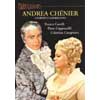Giordano Andrea Chenier
Corelli and Cappuccilli are on superb form in this well-conducted, made-for-TV Chenier
View record and artist detailsRecord and Artist Details
Composer or Director: Umberto Giordano
Genre:
Opera
Label: Hardy Classics
Magazine Review Date: 4/2003
Media Format: Digital Versatile Disc
Media Runtime: 110
Mastering:
Stereo
Catalogue Number: HCD4008

Tracks:
| Composition | Artist Credit |
|---|---|
| Andrea Chénier |
Umberto Giordano, Composer
Bruno Bartoletti, Conductor Celestina Casapietra, Maddalena, Soprano Cristina Anghelakova, Madelon, Mezzo soprano Ermanno Lorenzi, Incredibile, Tenor Florindo Andreolli, Abate, Tenor Franco Corelli, Andrea Chénier, Tenor Gabriella Carturan, Contessa de Coigny, Mezzo soprano Giorgio Giorgetti, Mathieu, Baritone Giovanna di Rocco, Bersi, Mezzo soprano Leonardo Monreale, Pietro Fléville, Baritone Luigi Roni, Roucher, Baritone Mario Chiappi, Fouquier Tinville Milan RAI Chorus Milan RAI Orchestra Piero Cappuccilli, Carlo Gérard, Baritone Renzo Gonzales, Schmidt, Bass Umberto Giordano, Composer |
Author: Alan Blyth
This is something of a find – a production produced in Milan’s television studios in 1973 that does more than justice to Giordano’s verismo work about personal conflicts at the time of the French Revolution. It is directed, with considerable imagination, by the Czech Vaclav Kaslik, at the top of his profession in the ’70s. In realistic period sets he unerringly creates the milieu of a degenerate aristocracy in Act 1 and of the raw mob-rule of the Revolution in the succeeding acts. The only drawback is the poor lip-synch.
Conductor Bruno Bartoletti makes certain we are unaware of the score’s weaker moments and releases all the romantic passion in Giordano’s highly charged writing for his principals. Chénier was one of Corelli’s most notable roles so it is good that his splendid portrayal has been preserved for posterity. He does not disappoint with his excitingly trumpet-like tones and finely moulded phrasing of the composer’s grateful writing for his tenor hero, and – although already 52 – he still looks the part of the glamorous, challenging poet.
In some ways, Gérard – the defiant servant who becomes a leading revolutionary – is the work’s most interesting character, jealous of Chénier because he shares the poet’s love for Maddalena, yet generous to both when the authorities have Andrea in their grasp. Cappuccilli was famous in the part and here – at the height of his powers – he projects all the man’s conflicting feelings with enormous conviction on a stream of burnished tone. Celestina Casapietra, a generally underrated soprano from Genoa, is just what Maddalena should be, developing from the spoilt girl of Act 1 into the desperate and then self-sacrificing lover of the succeeding acts, and singing with a nice combination of tenderness and intense feeling. She and Corelli do full justice to their duets.
Giordano was adept at writing interesting cameos. Especially notable here are Gabriella Carturan as the aristocratic mother in Act 1, Cristin Anghelakova as the blind Madelon and Luigi Roni (a fine bass still singing today) as Chénier’s concerned friend Roucher; but all are well characterised. The RAI orchestra plays well, but unfortunately it is too backwardly placed as regards the singers.
Conductor Bruno Bartoletti makes certain we are unaware of the score’s weaker moments and releases all the romantic passion in Giordano’s highly charged writing for his principals. Chénier was one of Corelli’s most notable roles so it is good that his splendid portrayal has been preserved for posterity. He does not disappoint with his excitingly trumpet-like tones and finely moulded phrasing of the composer’s grateful writing for his tenor hero, and – although already 52 – he still looks the part of the glamorous, challenging poet.
In some ways, Gérard – the defiant servant who becomes a leading revolutionary – is the work’s most interesting character, jealous of Chénier because he shares the poet’s love for Maddalena, yet generous to both when the authorities have Andrea in their grasp. Cappuccilli was famous in the part and here – at the height of his powers – he projects all the man’s conflicting feelings with enormous conviction on a stream of burnished tone. Celestina Casapietra, a generally underrated soprano from Genoa, is just what Maddalena should be, developing from the spoilt girl of Act 1 into the desperate and then self-sacrificing lover of the succeeding acts, and singing with a nice combination of tenderness and intense feeling. She and Corelli do full justice to their duets.
Giordano was adept at writing interesting cameos. Especially notable here are Gabriella Carturan as the aristocratic mother in Act 1, Cristin Anghelakova as the blind Madelon and Luigi Roni (a fine bass still singing today) as Chénier’s concerned friend Roucher; but all are well characterised. The RAI orchestra plays well, but unfortunately it is too backwardly placed as regards the singers.
Discover the world's largest classical music catalogue with Presto Music.

Gramophone Digital Club
- Digital Edition
- Digital Archive
- Reviews Database
- Full website access
From £8.75 / month
Subscribe
Gramophone Full Club
- Print Edition
- Digital Edition
- Digital Archive
- Reviews Database
- Full website access
From £11.00 / month
Subscribe
If you are a library, university or other organisation that would be interested in an institutional subscription to Gramophone please click here for further information.




